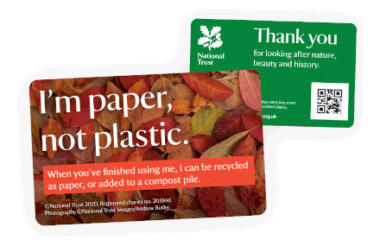The National Trust will now issue durable, recyclable and compostable paper membership cards, as part of its plans to reduce its impact on the environment.
By switching to the new material for the five million cards it sends to members, the National Trust says it will remove 12.5 tonnes of plastic, which is the equivalent of the weight of two African elephants.
People renewing their membership will be sent the new card from March. The card is made from a special type of strong and durable paper, and features a tough water-based coating.
The paper is certified by the Forest Stewardship Council (FSC) – an international organisation that promotes responsible management of the world’s forests. The new cards are also produced in a mill which is powered by its own biomass.
Once the card expires it can be composted or thrown away with paper as part of regular household recycling.
The National Trust made the change after a survey of its members, which found that more than half were prepared to make lifestyle changes to protect the environment. The Trust said the new card is also cheaper to produce than the old one.
Hilary McGrady, director general of the National Trust, said the charity has a “responsibility to do everything we can to fight climate change, which poses the biggest threat to the places, nature and collections we care for”.
The charity is also removing single use plastic from other items. It is replacing food and drink packaging with compostable alternatives, offering discounts on hot drinks for people who have brought a reuseable cup, and wrapping its member magazine in potato starch.
|
Related articles












